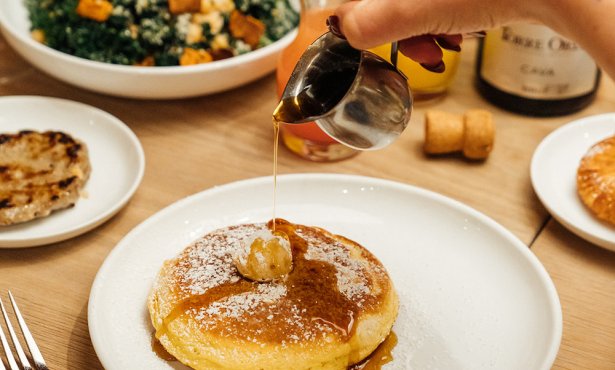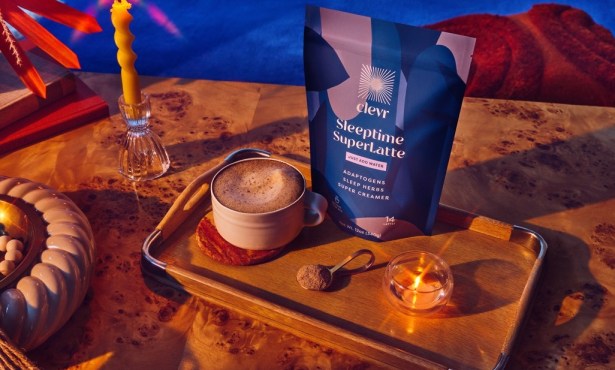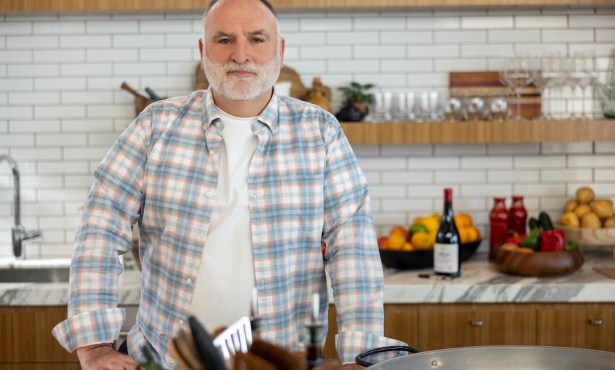Alton Brown’s Edible Inevitable Tour Hits S.B.
TV Star and Award-Winning Food Geek to Perform at the Granada
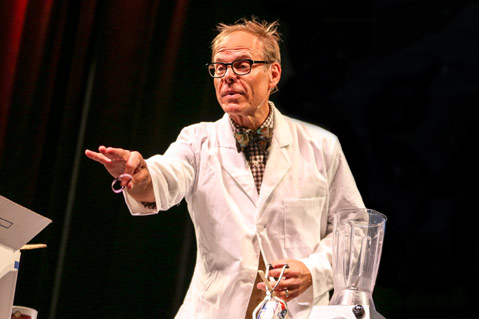
If anyone has the right to crusade against “uni-taskers,” it’s TV’s reigning food geek, Alton Brown. After all, in addition to creating, producing, and hosting his game-changing and Peabody Award-winning show Good Eats for 13 years, he’s starred on The Next Iron Chef, Iron Chef America, The Next Food Network Star, Feasting on Asphalt, Feasting on Waves, and Cutthroat Kitchen, and in 2011, he took home the James Beard Award for Best TV Food Personality. In the meantime, he’s managed to write seven books (the first of which also earned a James Beard Award in 2002), produce a regular podcast series, tweet regularly (in “analog” form: his 140-character thoughts are generally written on post-its, photographed while stuck to his computer monitor), and put together Alton Brown Live! The Edible Inevitable Tour, an epic nationwide variety show that hits Santa Barbara next Wednesday. The show will feature everything from singing to audience participation to food demos — and yes, there will be a poncho zone. I spoke with Brown a week before the tour kicked off, talking everything from puppets to processed food.
The show sounds like quite a production. Singing, dancing, puppets, demos … Can you tell me about why you wanted to do this tour? And whether Gallagher was an inspiration to you in your early years? No dancing! Absolutely no dancing! It’s a variety show with some very large, potentially frightening food demos, puppets, stand-up, audience interaction, five or six songs. I’ve been doing live stage shows in one form or another for 10 years but never had the time or an organization behind me that would allow me to put together something large and consumer — and I’ve been kinda busy making TV shows for the last 15 years! I really enjoy live audiences; my college degree was in theater — I guess I’ve never gotten over that. When I had the opportunity to team up with a really good production company, I jumped. It took years to carve out the time, so I’m jazzed.
On a scale of one-to-10, how necessary do you expect the ponchos to be? The show isn’t built to be messy, but one demo involves large amounts of compressed gasses, and whenever you mess with that stuff, there’s a possibility — all it takes is one person with a white cashmere sweater. This isn’t a Gallagher show where I’m pummeling people with chunks of watermelon; these are purely prophylactic devices meant to quell any possible dry-cleaning bills. If people don’t want to wear them, they don’t have to — sometimes I don’t make a mess. The poncho zone isn’t a sales tool — “Hey, come on down! I’ve got ponchos!” They’re really kind of ugly, and you wouldn’t want one, but you know, if you show up in your wedding dress, you might want the poncho.
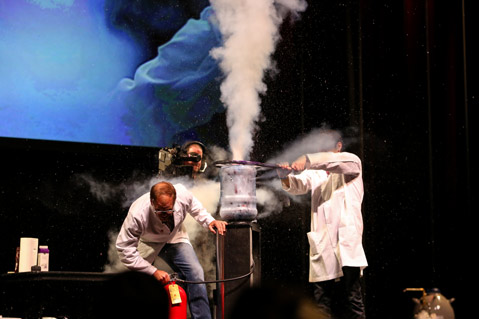
Among other things. In terms of television, you’ve kinda done it all; what’s been the most enjoyable? By all means Good Eats, which I did for 13 years, because I got to write it, direct it, produce it, oversee the editorial. My wife, the president of our production company, referred to it as a snowflake factory because every day I was making precious, unique little snowflakes. For myself, it was the cat’s meow. I had complete control, and I like that! But every job has its own rewards. I’m having a lot of fun making Cutthroat Kitchen.
I imagine coming up with the stuff you throw at the contestants must be pretty entertaining. Oh yeah, and it’s not random. Not only do we test every sabotage; we test them in combination with other sabotages because we want to know that they’re survivable. You just have to be clever, think fast on your feet. I think as more potential contestants watch the show, they’re gonna learn how to play the game better. For instance, here’s a tip in case you ever find yourself competing on Cutthroat Kitchen: No matter what the challenge is, do not come out of that pantry without eggs and flour; because eggs and flour are the atomic matter of 90 percent of food. If you get something taken away from you, odds are you can use eggs or flour to bounce back.
Wow. Noted! You have a forthcoming documentary called Foods That Made America; want to talk about that a bit? That’s still in planning stages. I’ve been working on various history-of-food projects that have all fallen apart for one reason or another, so I don’t want to talk about it, because I don’t want to jinx it! But I’ll let you know.
Fair enough. So it’s often reported that you went to culinary school with the express intention of coming out of there and making a cooking show, as you found what there was back then “dull and uninformative.” How would you characterize food television now, and if your younger self was looking around, what would he feel is missing? Wow; good question. I don’t know how to answer that. Because now, at least in prime time, there are no cooking shows on Food Network. There are in daytime, but nighttime’s all competitions or game shows. The cooking shows have all gone to the Cooking Channel. If I were doing it now, I’d still do what I did. Good Eats was me. It wasn’t a strategized reaction to a marketplace; it was the show I wanted to make. Here’s the thing: I think Good Eats changed the game. That’s not me saying, “Gee, I’m genius,” but to some degree, it had an effect on the larger — it certainly changed Food Network and may have even changed the path of food in America. So it’s almost like, if I hadn’t done that then, I don’t know what the food media landscape would look like now. I haven’t contemplated that before because my brain’s not big enough, but I have to say that every now and then in a life, you get to do the thing that you’re meant to do, and I think regardless of when it was, that was the show I was meant to make.
You contributed an essay to Wired magazine’s recent food issue about a company called Beyond Chicken. In it, you bring up some obstacles to widespread adoption of meat substitutes — or analogs, as you call them: There’s the “carnivore-type” mindset of not wanting “meat imposters,” and then there’s the aversion to processed foods. Do you think we’ll see a day where we’ll get beyond those biases? I enjoy meat. I have no intention of giving it up. I will sidestep meat occasionally to eat a replacement I like, but I’m not going to replace a Sunday roast chicken with Beyond Meat pieces. I will replace something I put in scrambled eggs, or tacos, but … I’m not becoming a vegetarian. Not unless you pull my teeth out, and — I don’t know what it would take. I’m here to eat animals, okay?
But I worry about the systems we create to provide those animals. I’m not a fan of most of those systems. I’m not a fan of how chickens are raised in this country on a factory level; I’m not a fan of commercial beef processing in this country. I get most of my meat from farmers around my area. I’m lucky because I can afford it, and I live in a region where lots of things are raised. My fondest wish would be that our adopting and truly accepting some analogs, as I say, would allow us to change the way we produce our animals. My problem is not with killing animals; my problem is letting them live terrible lives up until the time we kill them.
And what about the issue of processed food? [Beyond Meat] is manufactured — but it’s not like there are huge vats of oozing chemicals; these are natural ingredients being brought together … I don’t have a problem with processed foods. Reading the ingredients on a package … That’s where I have a problem, but when you look at the side of a box of Beyond Meat, everything makes sense. I know what [the ingredients] are; I know what they do. I don’t have a problem with putting it in my body. But people get on a high horse and think if a word’s got more than four syllables, it must be bad, which is just ignorant … It’s something we need to wrestle with because we live on a planet with a bigger population every day, have kind of a rocky relationship with most of the animals we eat … You know … We have issues. We’ve got problems!
For sure. Okay, last one: You’re fairly outspoken about your dislike of uni-taskers, but I wonder if there’s some magical uni-tasking gadget you secretly have at home? I have a pretty strict rule: If I find a tool I like, I’ve got to find other things for it to do. I’m actually standing in my kitchen right now and opening drawers and looking. I don’t see any uni-taskers. No. No, that’s not… I have a juicer, a large-format citrus juicer. It allows me to very quickly make large amounts of orange juice, but you can juice lots of different things in there. Is that a uni-tasker?
That’s kind of walking the line. I’ve got to think that through… No, I do not currently possess a uni-tasker. I would admit if I did. I totally would admit it!
4•1•1
See Alton Brown’s Edible Inevitable Tour Wednesday, October 23, at 7:30 p.m. at the Granada Theatre, 1214 State Street. For info and to purchase tickets, call 899-2222 or visit granadasb.org.

